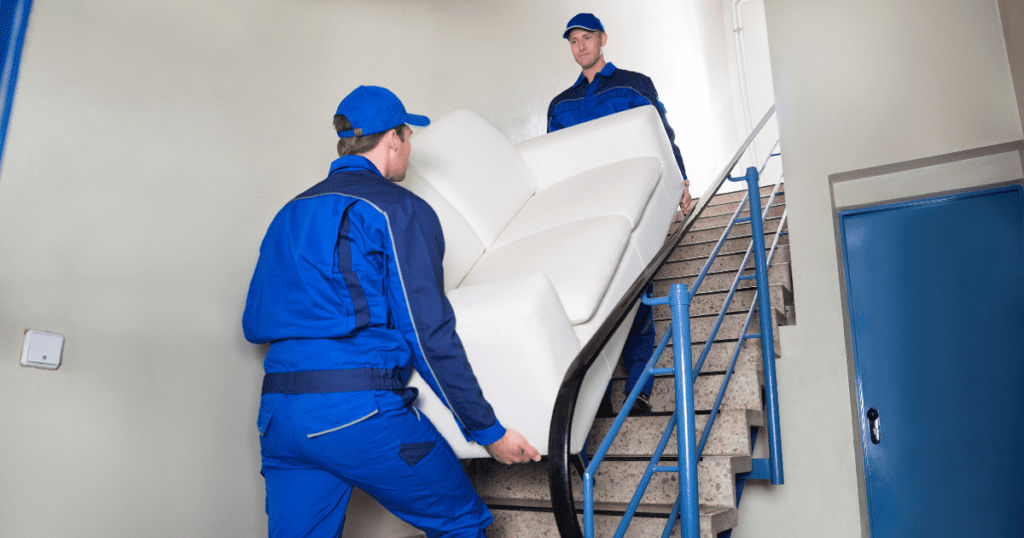
The Importance of Understanding Moving Costs Before Hiring Movers
Moving can be an exciting and stressful time all at once. You’ve found your new dream home, but now comes the tedious task of packing up your entire life and moving it to a new location. While the thought of having professional movers do the heavy lifting may seem appealing, it’s crucial to understand the costs associated with a local move before hiring them.
Without proper research on moving costs, you could end up paying much more than you initially anticipated. How much do movers cost for a local move? The last thing you want is to have your budget blown after hiring movers and then being hit with surprise fees and charges.
By having a better understanding of what factors influence moving costs, you can make informed decisions about how to minimize expenses. Furthermore, understanding moving costs can give you an advantage when negotiating with moving companies.
Knowing what typical prices are for certain services will enable you to negotiate prices that are fair for both parties involved. Ultimately, taking the time to research and understand moving costs could save you hundreds or even thousands of dollars in the long run.
Factors that Affect Moving Costs
The cost of a local move can vary depending on several factors that contribute significantly to pricing differences between different companies. These factors include things like distance, size of the home, amount of belongings being moved, as well as time of year or seasonality. Distance is one critical factor in determining how much movers will charge for their services.
Shorter moves within a city or town limits will generally cost less than longer-distance moves outside those boundaries due, primarily because there are fewer logistics involved with shorter moves. The size and complexity of your move also play into how much it will cost overall – larger homes with more furniture or items requiring special handlings, such as pianos or antiques, will naturally require more resources from professional movers, which will increase the overall cost of the move.
Similarly, if you need help packing or unpacking your belongings, this will add additional costs to the total bill. The time of year you choose to move can also impact the cost of your move.
Summer months are considered peak season for moving companies and therefore tend to be more expensive than other times of the year when demand is lower. Holidays and weekends also typically have higher rates than weekdays.
How much do movers cost for a local move?
It’s essential first to understand how professional movers generally charge for their services before attempting to compare prices between companies. The most common pricing structure involves an hourly rate plus any additional fees such as truck rental or packing materials. Hourly rates usually vary depending on the level of service you require from your moving company.
Some companies may offer a basic service that only includes loading and unloading without any additional perks like packing or unpacking assistance, while others may offer full-service packages that include both loading/unloading and disassembly/reassembly of furniture items as well as packing and unpacking services. Additional fees that may apply could include truck rental fees if not already included in their hourly rate; charges for extra labor hours incurred due to delays in loading/unloading; fuel surcharges (which can fluctuate based on gas prices); etc. It’s essential to ask upfront what fees apply so that there are no surprises later on.
Hidden Costs to Watch Out For
No matter which company you choose, there are always going to be hidden costs involved in a local move. These costs can vary widely depending on several factors, including whether or not you need special handling equipment such as dollies or hand trucks; extra labor hours incurred due to delays in loading or unloading; fuel surcharges (which can fluctuate based on gas prices), etc.
One way to avoid these extra charges is by being prepared upfront about your move and the services you need from your moving company. Be upfront about any special handling requirements, additional stops along the way, or any items that require special attention during transport.
Overall, understanding moving costs when planning a local move can save you a lot of time and money in the long run. By researching different companies and comparing their prices and services, you will be able to make informed decisions about which moving company is best suited for your needs.
The Factors That Really Affect Moving Costs
Moving is not an easy task, and it can be quite expensive if you don’t plan properly. It’s important to understand the various factors that can affect the cost of a local move so that you can make an informed decision about hiring movers. Here are some factors to consider:
Distance
One of the most significant factors that affect moving costs is the distance between your old home and your new one. The further away you’re moving, the more expensive it will be to hire movers. This is because movers charge by the hour and also factor in travel time when calculating costs.
If you’re moving locally, try to find a moving company that charges a flat rate instead of hourly rates. This way, you’ll know exactly how much you’ll be paying upfront and won’t have to worry about unexpected charges.
Size of Home
Another critical factor in determining moving costs is the size of your home. If you have a lot of belongings or are moving from a larger home, then your costs will likely be higher than if you were downsizing. For example, if you’re moving from a two-bedroom apartment into a three-bedroom house, your costs will be significantly higher than if you were just moving from one one-bedroom apartment to another.
Time of Year
The time of year can also greatly impact how much it will cost for your local move. Moving during peak season (usually summer) will generally cost more than if you were to move during non-peak season (fall/winter). Peak season tends to be busier for movers since many people prefer to move when their kids are out of school or before starting new jobs.
So if possible, try scheduling your move during off-peak times when movers may have more flexibility with pricing. There are many factors that can affect moving costs.
By understanding these factors, you can plan accordingly and potentially save money on your local move. Remember to research different moving companies and get quotes from multiple sources to find the best deal.
The Cost Breakdown
Hourly rates for movers: When it comes to hiring movers, the hourly rates can vary greatly depending on the company and location. Typically, rates can range from $60 to $150 per hour for a team of two movers.
However, keep in mind that cheaper doesn’t always mean better. You may end up with unprofessional or inexperienced movers who may damage your belongings or take longer than expected. It’s important to do your research and read reviews before choosing a moving company based solely on their hourly rate.
Truck rental fees: In addition to paying for the labor of the movers, you may also have to pay for the use of a moving truck.
The cost of truck rental can vary depending on the size and distance traveled, but expect to pay around $20-40 per day plus mileage fees. Keep in mind that some moving companies include truck rental fees in their overall price quote, so make sure you ask about this when obtaining quotes.
Additional Fees: Moving companies may charge additional fees for packing materials such as boxes and tape, as well as insurance coverage to protect against damages or losses during transit. These fees can quickly add up, so it’s important to carefully review any estimates provided by moving companies and ask about additional charges before signing any contracts.
Some companies offer all-inclusive packages that include packing materials and insurance coverage at no extra cost, which could be a good way to save money. When considering hiring professional movers vs. doing it yourself (DIY), remember that DIY moves come with their own set of costs, such as renting a truck and purchasing packing materials which can really add up if you have a lot of belongings or if you’re moving long-distance (where gas costs become an issue).
Don’t be afraid to negotiate with your chosen moving company on costs and services offered – they want your business, after all! And it’s better to take the time to negotiate than to regret paying too much later on.
Hidden Costs to Watch Out For
The Shocking Reality of Hidden Moving Costs
Moving day can be a stressful and overwhelming experience. The last thing you want is to be hit with unexpected fees and charges that were not disclosed to you upfront. Unfortunately, hidden costs are all too common in the moving industry, and many unscrupulous movers will try to take advantage of unsuspecting customers.
One hidden cost to watch out for is fuel surcharges. Some moving companies will charge an additional fee for fuel, which can quickly add up if you are moving a long distance.
Make sure you ask about fuel charges upfront and get them in writing so that there are no surprises on a moving day. Another hidden cost that many people overlook is the cost of moving heavy items like pianos or safes.
These items require special equipment and expertise to move safely, which means that movers may charge extra for this service. Be sure to mention any such items when getting a quote from a mover so you can plan accordingly.
Avoiding Hidden Moving Costs: Tips & Tricks
The best way to avoid hidden costs on a moving day is to do your homework upfront before hiring a mover. Start by researching several different companies and reading reviews from previous customers online. This will give you an idea of what kind of service each company provides and whether they have any hidden fees.
When getting a quote from a mover, make sure it includes all of the services you need, such as packing materials or furniture disassembly/reassembly. Ask about any additional fees or surcharges so there are no surprises on the final bill.
If possible, try to negotiate with the mover for a flat rate instead of an hourly rate, as hourly rates can sometimes result in unexpected charges if the move takes longer than expected due to unforeseen circumstances like traffic or difficult access points. Make sure everything you agree on is in writing.
This includes the final cost, any additional fees, and the services included. This will protect you from any surprises or disagreements on a moving day.
Moving is already a stressful and expensive process, so it’s important to be aware of hidden costs that can add up quickly. Do your research and ask questions before hiring a mover to avoid unexpected fees on a moving day. Remember, if something seems too good to be true, it probably is!
DIY vs. Hiring Movers: Which is More Cost Effective?
The Great Debate
When it comes to moving, one of the biggest questions people ask themselves is whether to hire professional movers or make a DIY move. It’s a tough decision that can have a significant impact on your wallet.
But which option is really the most cost-effective? Let’s break it down.
Hiring Professional Movers
Hiring professional movers can be a great option if you’re short on time, don’t want to handle heavy lifting yourself, or simply want an extra set of hands. However, this convenience comes at a price.
Professional movers charge based on hourly rates and other fees that can add up quickly. On average, the cost of hiring professional movers for a local move ranges from $75 to $100 per hour for two movers and a truck.
This might seem reasonable at first, but keep in mind that this rate can vary depending on where you live and what time of year it is. Additionally, many moving companies charge fees for things like packing materials or insurance coverage.
DIY Move
Making a DIY move may seem like the cheaper option at first glance because you won’t have to pay for professional help. However, there are still costs associated with doing it yourself.
Firstly, you’ll need to rent a truck or trailer- which isn’t cheap! Depending on how far you’re moving and how big your home is, truck rental costs range anywhere from $20-$40 per day plus mileage charges which could be anywhere from $.59 – $.79 per mile.
Then there are fuel charges- depending upon the distance traveled, these costs could easily add up to several hundred dollars more than what you’d pay if hiring professionals. Don’t forget about things like boxes and packing materials – these expenses will also be added to your total DIY moving cost.
Which is More Cost Effective?
So, which option is more cost-effective? The answer is it depends. If you have a lot of items or a large home and want to save time and effort, hiring professional movers may be the way to go.
However, if you’re on a tight budget and don’t mind doing the heavy lifting yourself, a DIY move may be the better option. It’s important to consider all factors before making your decision.
What might seem like the cheaper option at first glance may end up costing you more in the long run. Always weigh convenience against cost and do what’s best for your specific situation!
Negotiating with Movers: Getting the Best Price Possible
The Art of Negotiation
Negotiating with movers can be a daunting task, but it is essential if you want to get the best price possible. Start by researching different moving companies and getting multiple quotes. This will give you leverage when negotiating with a particular company.
Be confident and assertive in your negotiations, but don’t be rude or aggressive. Remember, you are trying to establish a mutually beneficial agreement.
Timing is Everything
The timing of your move can also affect your ability to negotiate with moving companies. If you have flexibility in your move date, consider scheduling it during the off-season (typically November to April) rather than peak season (May to September). Moving during the off-season can lead to lower prices and more room for negotiation.
Bundling Services
Another way to save money on your move is by bundling services. Many moving companies offer packing, unpacking, and storage services in addition to their standard moving services.
Bundling these services together can result in significant cost savings. Ask about any discounts or promotions they may have available for bundled services.
Frequently Asked Questions
What is a good moving budget?
A good moving budget is one that takes into account the costs of hiring professional movers or renting a moving truck, packing supplies, transportation, and any additional services needed, while also considering your personal financial situation and priorities.
How do I plan a local move?
To plan a local move, start by creating a checklist of tasks, including hiring movers or renting a truck, gathering packing supplies, decluttering and organizing your belongings, notifying relevant parties of your address change, and setting a realistic timeline for completing each task.
How do you calculate moving expenses?
Moving expenses can be calculated by considering various factors such as the distance of the move, the size and weight of your belongings, the need for additional services like packing and storage, and any other specific requirements or requests you may have.
How can I save money on a local move?
To save money on a local move, you can consider DIY options such as packing your belongings yourself, recruiting friends or family to help with the move, renting a truck instead of hiring professional movers, comparing quotes from different moving companies to find the best price, and timing your move during off-peak seasons or days.
How long should a local move take?
The duration of a local move depends on factors such as the size of your current home, the distance to your new home, the number of belongings you have, the efficiency of the moving process, and any unforeseen circumstances. Generally, a local move can range from a few hours to a full day.
What expenses are covered in moving?
The expenses typically covered in a moving process include hiring professional movers or renting a moving truck, packing supplies, transportation costs, insurance, storage fees (if applicable), and any additional services requested, such as packing, unpacking, or furniture assembly.
Conclusion
Moving costs for a local move can vary greatly depending on several factors, such as distance, size of the home, amount of belongings, and time of year. Understanding these factors enables individuals to make moves to anticipate and avoid hidden costs that could skyrocket their budget. It is important that people do not shy away from negotiating with moving companies as this could help them secure more favorable prices, especially if they are flexible with their move dates or willing to bundle up some services together at discounted prices.
There are ways people making local moves can significantly cut down on expenses if they do their research well while keeping an open mind during negotiations with prospective movers, understanding that most moving companies are willing to compromise a little on pricing to keep the business moving. Moving can be tough, but it does not have to break the bank.






